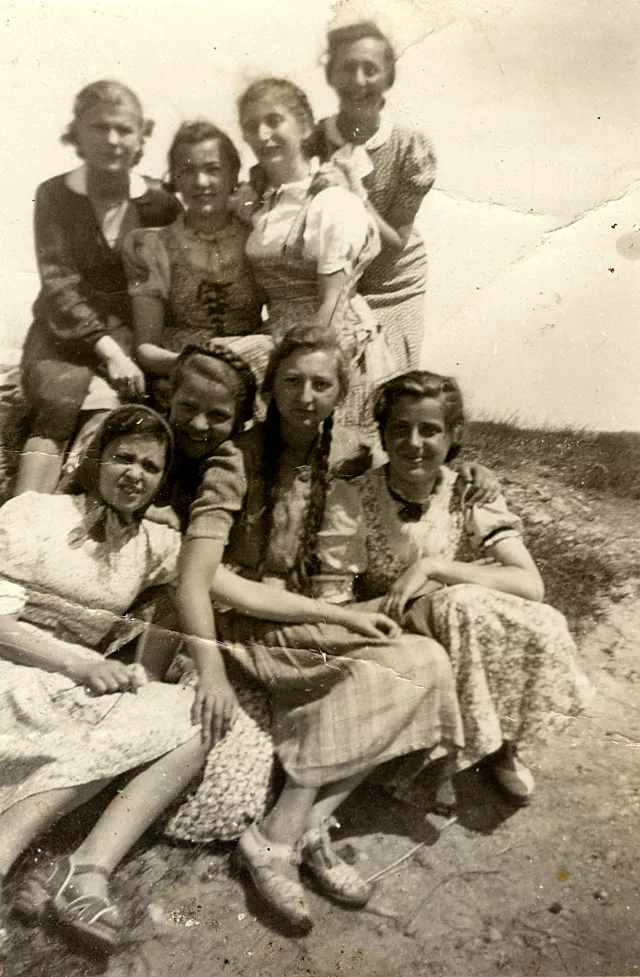Danuta Mniewska, her sister Helena Tenenbaum and their friends during the war
This photo was taken in Rakow [suburb of Czestochowa] in 1940. These are my friends, Polish and Jewish girls. I am second from left in the second row. My sister Helena Tenenbaum (nee Mniewska) is third from left in the first row. The girl on my left, first from left in the second row, is Zonka Majerowna. Her sister Niunka is second from left in the first row. A Jewish girl, Bronka Nomberg, is next to her, she is first from left. After the war she left for USA. I do not remember three names: two friends on my right and the girl sitting to my sister's right. I only remember her being a beautiful girl.
Before the war I lived with my parents, my maternal grandparents and my sister in Lodz in a Polish neighborhood, because there were more Poles there than Jews, near Hallera Square, on 1 Maja Street. I didn't experience any anti-Semitism before the war. But you heard things. I remember when the pogroms took place, in Przytyk, there was talk about that, people were scared. Then, when the boycott of ritual meat came, I was already a teenager, I may have been twelve years old, so I understood certain things.
My father was heavily involved in the Zionist organization, so when the Germans marched in and started arresting people - Jews in the first place - my parents decided to go to Czestochowa, to their friends, Mr. and Mrs. Szymkiewicz. Those were friends back from Lodz, they used to live on the same street as us. A mixed marriage, him a Jew, her a Pole. He was a violin player at the Lodz Philharmonic, she was from Czestochowa. And so in December 1939 my parents closed down the store, locked up the apartment. Everyone was fleeing from Lodz, because Lodz was very dangerous.
Mr. and Mrs. Szymkiewicz rented an apartment for us, a studio, in a working-class neighborhood called Rakow, in the suburbs of Czestochowa, near a steel plant. I don't remember the street name. We lived together with my grandparents. That was just to wait out - there was no electricity, only carbide light, water in the yard. My parents were selling out the things we had taken with us. In fact, everyone lived off petty trade. There was no work, unless you were a young man and joined the Jewish police. Well, doctors, craftsmen - tailors, shoemakers - they had work.
We weren't allowed to go to school. But there was a lady, Ms. Skapska, who had been displaced from Poznan, and she taught me and my sister English. I loved her because she was a great teacher. She was able to keep your attention, and I was making such great progress - my orthography was excellent, my pronunciation was excellent. She was enchanted with me, I was enchanted with her. But one day she came to us and said, 'Listen, I'm scared. I need the money, of course. So please, don't be angry with me, but I'm scared.' And that was the end? Then came some other teacher - but it wasn't the same, I no longer felt like learning English.
I had very many friends there, Poles, of course, because there were virtually no Jews. We were all roughly the same age. We went to the church for service, that was where young people met. And so I knew all the ceremonies - how to cross yourself, how to pray, how to sing. As far as religion was concerned, I was able to go to the Aryan side right away.






















